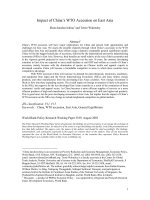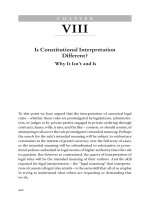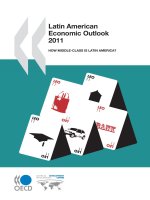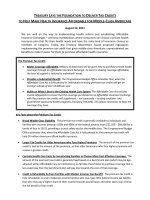Why isn’t thailand’s middle class fond of democracy east asia forum
Bạn đang xem bản rút gọn của tài liệu. Xem và tải ngay bản đầy đủ của tài liệu tại đây (304.93 KB, 8 trang )
Why isn’t Thailand’s middle class fond of democracy? | East Asia Forum
1 trong 8
/>
Economics, Politics and Public Policy in East Asia and the
Pacific
Home
Topics
Development
Economics
G20
International Relations
Politics
Trade
Other Topics
2016 in review
2015 in review
2014 in review
2013 in review
2011 in review
2010 in review
2009 in review
2008 in review
Asian Century
ASEAN
Asia and the Global Financial Crisis
Regional Architecture
Security
China-Japan Relations
Chinese outward FDI
Chinese political transition
Chinese RMB
Climate change
Foreign aid
Japanese politics
Inequality in Asia
Trans-Pacific Partnership
United States and Asia
US-Japan alliance
Editorials
WTO
Countries
Map Article Browser
Australia
China
India
Japan
DPRK
11:07 SA, 25/11/2017
Why isn’t Thailand’s middle class fond of democracy? | East Asia Forum
2 trong 8
/>
ROK
USA
Indonesia
Other Countries
Bangladesh
Malaysia
New Zealand
Pakistan
Papua New Guinea
Philippines
Russia
Singapore
Taiwan
Thailand
Mongolia
Myanmar
Vietnam
Cambodia
Contributors
Quarterly
About
Why isn’t Thailand’s middle class fond of democracy?
25 July 2017
Author: Pavin Chachavalpongpun, Kyoto University
The growth of the middle class and civil society plays a pivotal role in the promotion of democracy. They
closely monitor a government’s performance and its commitment to good governance. The middle class also
demands access to political resources, while underscoring the importance of participatory democracy. But in
Thailand the orthodox concept of the middle class as an agent of democratic change seems to be under
challenge.
11:07 SA, 25/11/2017
Why isn’t Thailand’s middle class fond of democracy? | East Asia Forum
3 trong 8
/>
Since the Thai political crisis of 2005, which culminated a year later in the military coup that overthrew the
elected government of Thaksin Shinawatra, it has become apparent that the Thai middle class and the
country’s many civil society organisations are no longer agents of change, but instead have become guardians
of the ancien régime.
In 2005, the Bangkok-based middle class, under a new movement called the People’s Alliance for
Democracy (PAD), took to the streets to topple Thaksin, largely considered a champion of the poor, on the
grounds that he abused power for his own benefit.
On the surface, the middle class and civil society claimed to be guarding democracy, which had supposedly
been tainted by Thaksin. At a deeper level, however, it was the fear that Thaksin and his assertive populist
policies would empower marginalised rural citizens that explained why the middle class and civil society
rejected his kind of democracy.
The protesters also accused Thaksin of disrespecting the much-revered monarchy — an inviolable institution
in Thailand and long regarded as a symbol of prosperity for the Thai middle class. The monarchy provided
itself as an instrument for its supporters to disparage democracy, à la Thaksin, through a binary choice: moral
verses immoral politics, with the monarch representing the former and selfish politicians the latter.
Chakrit Tiebtianrat argues that Thaksin was the first prime minister who sought to deal with civil society
systematically. He set out to co-opt those who could be co-opted, and to discredit those who could not, either
by dividing them from their supporters, or through more devious means such as using legal manoeuvers to
diminish the effectiveness of civil society.
But by selectively choosing to support certain civil society organisations, Thaksin also helped promote a
culture of corruption and nepotism. Critics interpreted this as Thaksin’s devious way of buying allegiances
and loyalty from his constituencies. Those civil society organisations that continued to cooperate with the
Thaksin government were perceived by critics as politically superfluous.
Meanwhile, those who challenged the integrity of Thaksin’s government were viewed with skepticism and
possibly harassed. A divide-and-rule tactic characterised the relationship between his government and civil
society in general. But civil society groups finally gained an upper hand over the government by joining
PAD. The ultimate goal was to rid Thaksin of political power.
PAD conveniently created a situation that enabled political intervention by the military. And in September
11:07 SA, 25/11/2017
Why isn’t Thailand’s middle class fond of democracy? | East Asia Forum
4 trong 8
/>
2006, the army staged a coup against the Thaksin government. In 2014, as prime minister Yingluck
Shinawatra began to consolidate her power on the strength of populist programs inherited from her brother,
the middle class and civil society organisations — now under a new name, the People’s Democratic Reform
Committee (PDRC) — returned to street politics, reviving the old trick of assigning themselves the role of
moral guardian against the supposed evil of Yingluck. Her premiership, like that of her brother, ended in a
military coup in May 2014.
The rise and fall of democracy in modern Thailand, as demonstrated in two successive coups, can be
described, on the one hand, as a situation in which the middle class and civil society could no longer tolerate
corrupt regimes and therefore gave their support to the coups. On the other hand, a deeper analysis is needed
to comprehend the complexity of Thai politics beyond a struggle between the ‘moral’ middle class and civil
society and ‘immoral’ politicians.
It is true that the ‘network monarchy’, which includes key institutions such as the monarchy, bureaucracy and
military, had long governed Thai politics, and the middle class and civil society became enthusiastic
supporters of the network monarchy, exploiting the revered status of the royal institution to reap benefits
from the system. Gradually, the alliance between the network monarchy and members of the middle class and
civil society began to isolate the rural population.
While the network monarchy was able to redefine the political landscape by placing the monarchy at the top
of the political structure, the rural population was allowed to participate in electoral politics on certain
conditions — their chosen governments must be subservient to the dominant network monarchy, otherwise
they would be overthrown in coups. This kind of structure permitted members of the network monarchy and
supporters among the middle class to defend their political territory, while at the same time appearing to
adhere to democratic processes.
Thaksin constructed his political network by highlighting the fact that the electoral process could be used to
overturn the power equilibrium and dismantle the status quo. He concentrated on winning votes from the two
regions of the country long marginalised by the network monarchy — the north and northeast. Thaksin could
count on those votes owing to his generous populist programs. His political party, Thai Rak Thai, won
landslide elections twice, causing grave concerns among the network monarchy and the middle class, which
retaliated through extra-parliamentary means.
The network monarchy, drawing on the powerful moral authority of King Bhumibol, might have dominated
the political realm in this way for several decades, but Bhumibol recently passed away, paving the way for his
unpopular son, Vajiralongkorn, to be enthroned. The new king is undoubtedly generating concerns among the
middle class and civil society groups because without Bhumibol their political interests are no longer
guaranteed in the transition period. This anxiety has driven Thailand’s middle class to further divorce itself
from trust in the democratic apparatus and its supposed role as an agent of democratic change.
At this critical royal transition, both the middle class and civil society do not even hide their taste for
authoritarianism. It manifests itself chiefly in politicisation and self-interest on their part.
Pavin Chachavalpongpun is Associate Professor at Kyoto University’s Center for Southeast Asian Studies.
This article was first published here on Global Asia.
11:07 SA, 25/11/2017
Why isn’t Thailand’s middle class fond of democracy? | East Asia Forum
5 trong 8
View more posts by Pavin Chachavalpongpun
RELATED POSTS
/>
Print This Post Download PDF
Peering into Thailand’s turbulent future by Pasuk Phongpaichit
Thailand’s stark choice by Andrew Walker
Thai election won’t solve political crisis by Pavin
Chachavalpongpun
The real meaning of Thailand’s
constitutional referendum by
Patrick Jory
Thailand returns
to military
monarchy by
EAF Editors
Lese Majeste losing its magic by Pavin Chachavalpongpun
Democracy delayed, democracy denied in Thailand by Pavin Chachavalpongpun
Thailand haunted by the ghost of absolutism by Patrick Jory
No luck for Yingluck as Thai elections nullified by
Thitinan Pongsudhirak
What Other People Are Reading
The Belt and Road Initiative and Asia’s changing order by Nick Bisley
No Comments
Post a
comment
East Asia
Democracy isn’t receding in Southeast Asia, authoritarianis... by Thomas Pepinsky
Singapore’s foreign policy at a juncture by Ja Ian ChongForum welcomes comments,
both for adding depth to
analysis and for bringing up
important new issues.
Original comments adding
insight and contributing to
11:07 SA, 25/11/2017
Why isn’t Thailand’s middle class fond of democracy? | East Asia Forum
6 trong 8
/>
The Timor Sea agreement is in hot water by Damien Kingsburyanalysis are especially
encouraged.
China under Deng Xiaoping’s leadership by Ezra Vogel
The editors retain the
right to refuse and edit
comments at any time.
Your email address will not be
published. Required fields are
marked *
ASEAN looks to the Fourth Industrial Revolution by Jayant MenonComment
Name *
Email *
Address *
Notify me of follow-up comments by email.
Notify me of new posts by email.
Donate to EAF
As a freely accessible resource for the region, East Asia Forum relies on donations from those who believe in
its importance. More information.
Subscribe
Weekly digest
Each post
More info and unsubscribe
Follow us
11:07 SA, 25/11/2017
Why isn’t Thailand’s middle class fond of democracy? | East Asia Forum
7 trong 8
Article Browser
RSS
/>
Google+
Features
November 19: Empowering the women of Japan
November 12: Improving equity and efficiency in Japanese higher education
November 5: Cambodian democracy on the ropes
October 29: ASEAN against the world on trade
Suggest an Idea
Do you have any feedback we can use to improve your experience at EAF?
Is there a particular topic you'd like to see us cover, or an author you'd like to hear more from?
Please let us know using the box below.
Editorials
About
11:07 SA, 25/11/2017
Why isn’t Thailand’s middle class fond of democracy? | East Asia Forum
8 trong 8
/>
Quarterly
Links
11:07 SA, 25/11/2017









